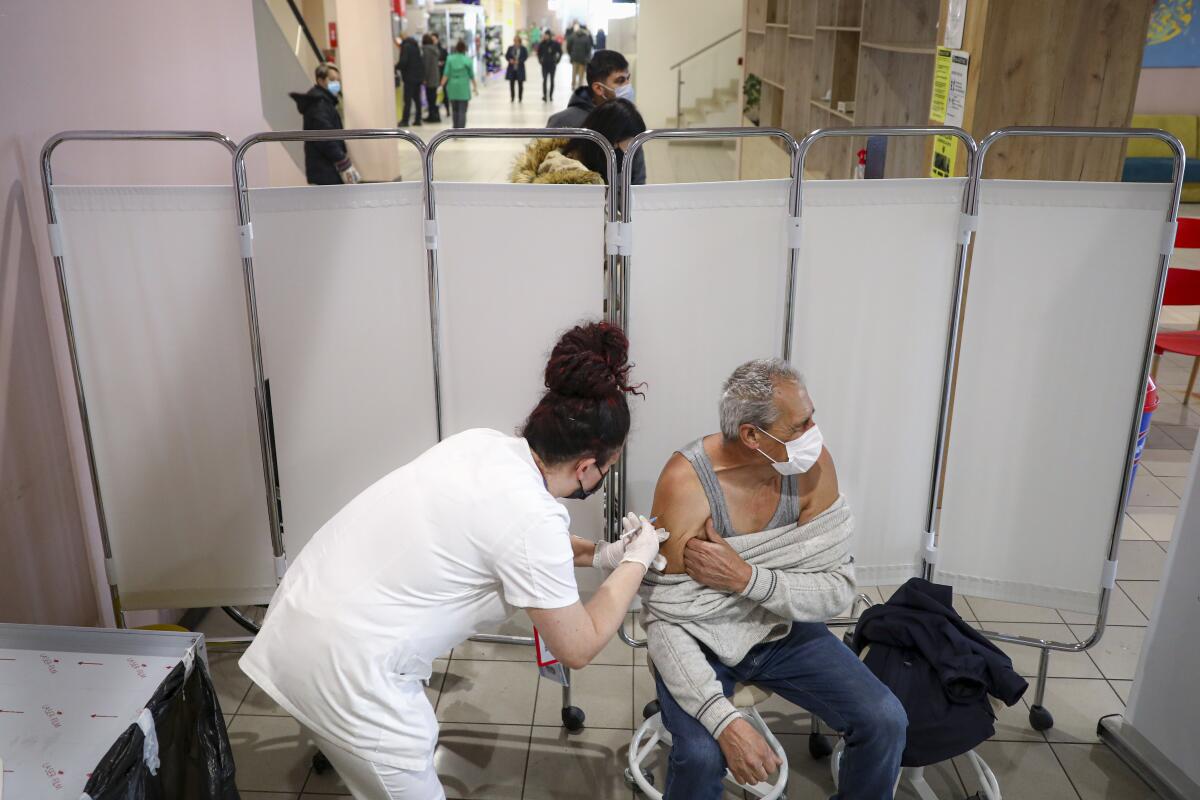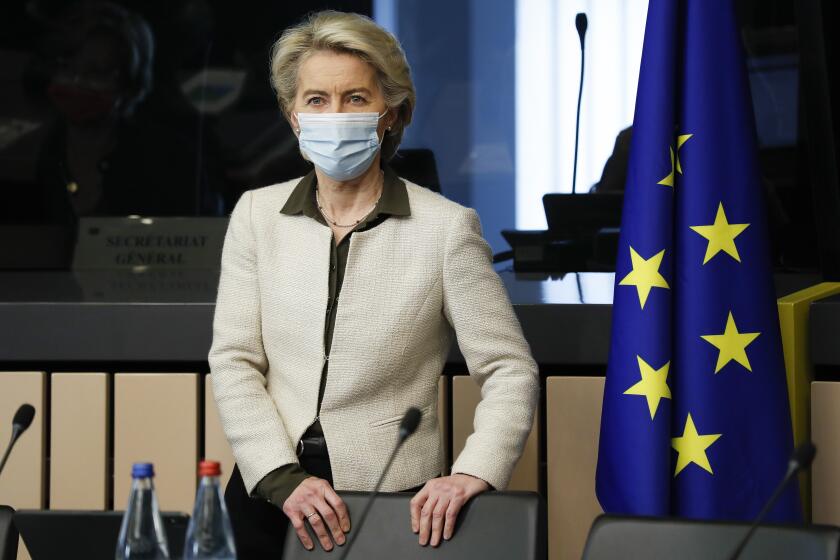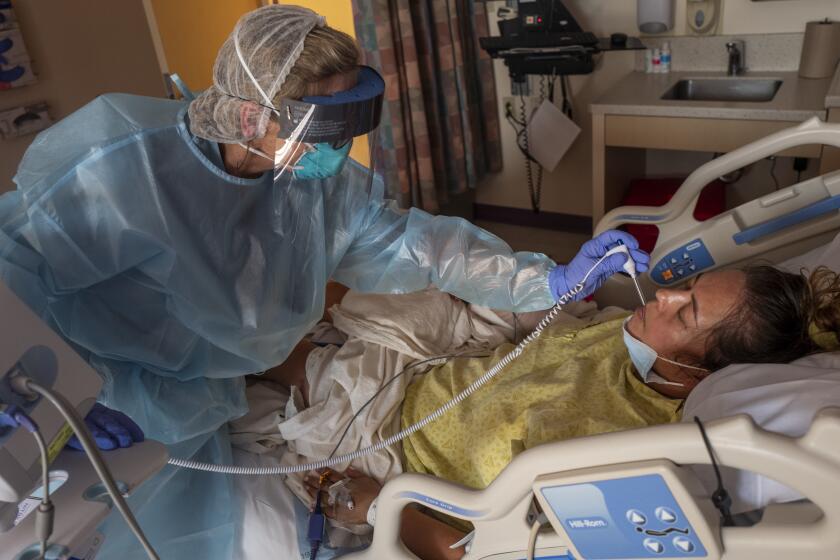Vaccine skeptics in Eastern Europe are having a change of heart

- Share via
SARAJEVO, Bosnia-Herzegovina — Some former vaccine skeptics in Eastern Europe have shifted over to the other side as coronavirus infections surge, countries are making it more difficult for the unvaccinated to travel abroad and authorities battle against government distrust and vaccine disinformation.
When she rolled up her sleeve in the Bosnian capital of Sarajevo to take her first COVID-19 vaccine dose, Fata Keco was afraid of possible adverse side effects. But she said the worst she had to contend with over the next few days was “moderately discomforting pain” in her left arm around the site of the injection.
More significantly, the 52-year-old self-employed cleaning woman has joined the global community of vaccine believers after months of “being very susceptible” to what she now describes as “the most ridiculous theories.”
She told the Associated Press that some of those that she heard were “that the coronavirus does not exist, that journalists were paid to spread panic, that planes were spraying us with viruses at night, that vaccines were being used by the powers that be to implant us with tracking microchips.”
“Now I feel relief for having done something to protect my health after putting myself in danger for a long time,” Keco said. “Also, I don’t mind that it will make my life easier if I decide to take a trip abroad.”
She isn’t alone in her transformation, especially after numerous European countries started tightening their anti-virus rules, including by requiring proof of vaccination from foreign visitors.
Though still dealing with a surge in Delta variant cases, the European Union expects Omicron to become the dominant coronavirus strain in a month.
“I want to travel and study abroad and for that I have to be vaccinated,” said Esma Dzaka, 18, after getting her first dose Tuesday in Sarajevo.
This week, health authorities in Sarajevo stepped up their efforts to administer COVID-19 vaccines as widely as possible, stymied so far by public mistrust and an onslaught of disinformation. They started dispatching nurses to dispense vaccines in local council offices and shopping centers around the city in hopes that easy access will persuade more people to get their shots.
Sarajevo’s top health official, Haris Vranic, said he believed that some vaccine skeptics have been having a change of heart recently, not just because they want to travel abroad freely, but also because the “numbers do not lie.”
“The statistic is clear — between 92% and 94% of our people who died in the third and the [current] fourth wave [of COVID-19] were not vaccinated,” Vranic said.
Bosnia, which is still struggling to recover from a devastating ethnic war in 1992-95, has so far inoculated just under a quarter of its 3.3 million people, one of the lowest vaccination rates in Europe.
But while such a level of mistrust in vaccines, which have been widely available since late last spring, may not be surprising in the poor, corruption-plagued and ethnically divided Bosnia, similar woes have befallen many of its Balkan neighbors, including some European Union members.
In Romania, a EU nation of about 19 million, the vaccination rate hovered around 28% until mid-October, when a sharp spike in new COVID-19 infections and deaths forced some hospitals to put body bags in their hallways as morgues ran out of space.
Fear — combined with stricter anti-virus measures introduced by authorities, including a nighttime curfew and requiring proof of vaccination, a recent recovery or a recent negative test to enter most public venues — has sent the vaccination rate in Romania spiking to over 40% by Dec. 10, according to Our World in Data.
“I was scared, there are so many [negative] rumors” about vaccines, said Ofelia Gligor, who got her first COVID-19 jab on a frigid December day this week in the main vaccination center in Sighisoara, a small, historic Romanian town 185 miles north of Bucharest, the capital.
The world struggled to come to terms with a new turn in the pandemic, with the World Health Organization warning Omicron poses a risk of new outbreaks.
The 18-year-old trainee nurse had to overcome her fears for a practical reason — without proof of vaccination, she wouldn’t be allowed to attend her training program at the local hospital.
“My advice to people now is to get vaccinated, because sooner or later vaccines will become mandatory” for all, she said.
A similar scenario played out in Croatia, which joined the EU in 2013. Amid a major surge in daily COVID-19 infections and deaths, Croatian authorities introduced a vaccine mandate on Nov. 15 for all public sector workers and all citizens using their services.
Despite sporadic protests against the COVID-19 restrictions, Croatia’s overall vaccination rate has since been steadily rising over 1.2% per week to encompass nearly 55% of its population of 4.2 million on Dec. 11.
In ethnically and administratively fragmented Bosnia, where jurisdiction over pandemic management is divided between 14 different levels of government that don’t always move in lockstep, the introduction of mandatory COVID-19 vaccination passes is still on hold. While indoor mask-wearing and social distancing mandates remain, their enforcement is haphazard.
Bosnia has seen over 12,900 COVID-19 deaths, but for some people like Keco, it took more than just mortality statistics to come to terms with the reality of the pandemic. It took a dispute with her daughter, Mahira.
“She said: ‘Mom, vaccines work 100%. Millions of people were vaccinated by now and they are all doing fine, don’t be silly,’” Keco recalled, adding that her son-in-law’s friend — who “claimed he would not be caught dead getting vaccinated” — got infected and COVID-19 “had left him feeling broken.”
“I finally realized that I need to get vaccinated if I want to be safe,” Keco said, shaking her head in bafflement. “People and their chatter crazed me. For a time at least, I believed in all their silly stories.”
More to Read
Sign up for Essential California
The most important California stories and recommendations in your inbox every morning.
You may occasionally receive promotional content from the Los Angeles Times.












